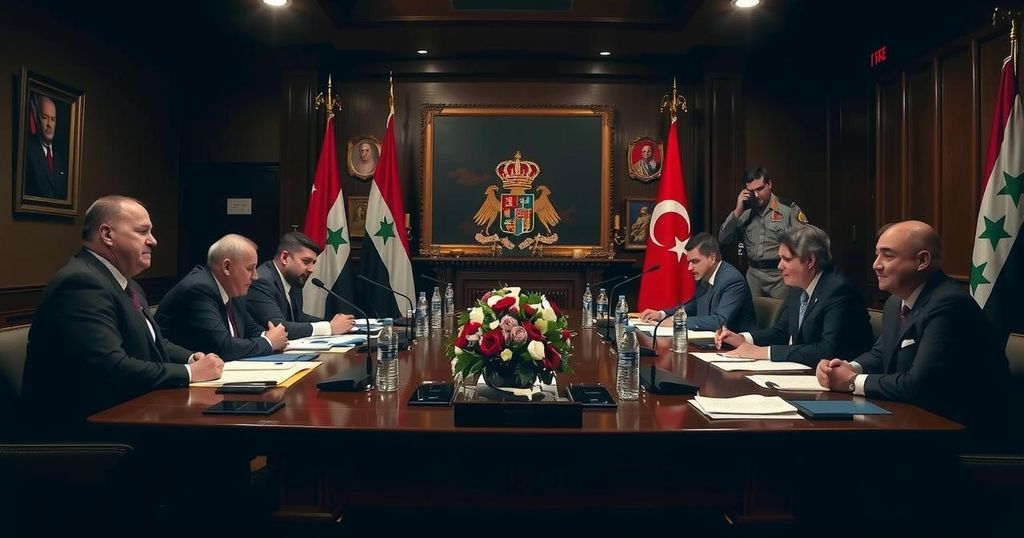World news
ABU DHABI, ARAGHCHI, ASIA, BASHA, CONFLICT, DAMASCUS, EMIRATI, HAYAT TAHRIR AL - SHAM, HEZBOLLAH, HTS, IRAN, IRANIAN REVOLUTIONARY GUARDS, IRNA, ISRAEL, MIDDLE EAST, MOHAMED BIN ZAYED AL - NAHYAN, REVOLUTIONARY GUARDS, SYRIA, SYRIAN CIVIL WAR, SYRIAN CONFLICT, TEHRAN, UNITED ARAB EMIRATES, WAR
Michael Grant
0 Comments
Iran’s Diplomatic Support for Assad Amid Escalating Syrian Conflict
Iran’s foreign minister, Abbas Araghchi, will visit Damascus to reaffirm support for Assad amid escalating challenges following Islamist advances in Syria, including the fall of Aleppo. The Syrian regime aims to mount a counter-offensive, with airstrikes reported across opposition-held territories as fighting reflects the instability of the region.
Abbas Araghchi, Iran’s foreign minister, will travel to Damascus on Sunday, signaling Tehran’s unwavering support for the Assad regime as it faces significant challenges following recent advances by Islamist groups in northern Syria, particularly the seizure of Aleppo. Araghchi’s visit aims to reinforce Iran’s alliance with President Bashar al-Assad’s government during a time of instability marked by territorial losses.
The Iranian diplomat expressed staunch backing for the Syrian government, stating, “We firmly support the Syrian army and government,” as reports indicated a strategic shift in control across northern Syria due to the offensive by Hayat Tahrir al-Sham (HTS). During this crisis, Assad reestablished communications with regional allies to coordinate efforts to stabilize his regime’s position.
The recent takeover of Aleppo has attracted concern from Assad’s allies, including Russia and Iran, raising alarm over this escalation. Internationally, U.S. officials dismissed claims of American involvement in the attacks perpetrated by HTS, which remains classified as a terrorist organization. Meanwhile, Syrian forces are reportedly orchestrating a counter-offensive aimed at regaining lost territories, supported by intensive airstrikes targeting opposition-held areas.
Amid these developments, the Syrian regime’s reliance on foreign aid from allies such as Iran and Russia is increasingly evident. The internal strife stirred by the insurgency serves as a reminder of the fragile dynamics within Syria, where local actors are constantly repositioning amidst shifting battle lines.
In summary, the conflict remains turbulent, with multiple actors engaging in a complex web of alliances and hostilities. The outcomes of recent military engagements and the responses from key international players will significantly influence the future of the Syrian regime and its control over the region.
The Syrian civil war, which erupted in 2011, has devolved into a multifaceted conflict involving international players and domestic factions. President Bashar al-Assad’s regime, challenged by various insurgent groups and a fractured opposition, has relied heavily on foreign support from Russia and Iran to maintain control. The recent rapid advance of Islamist insurgents, notably HTS, has jeopardized Assad’s authority, particularly with the fall of Aleppo, a pivotal city symbolizing both industrial power and military significance. This geopolitical tension continues to trigger complex responses both within Syria and abroad, complicating efforts for resolution amidst ongoing violence.
The unfolding situation in Syria underscores the intricate conflict dynamics as both domestic actors and foreign powers vie for influence. Iran’s diplomatic engagement in Damascus highlights its commitment to bolstering Assad during a precarious period of territorial loss. As the Syrian regime braces for counteractions amidst intensified military engagement, the implications for regional stability and international relations remain uncertain, with ongoing territorial shifts reflecting the unstable balance of power.
Original Source: www.theguardian.com




Post Comment